 August 23, 2019. One of our
graduates, Dr. Sivarajasingam
Mahendran, was selected
as a panel member by
the British Council. Dr. Siva,
an expert panel member and
judge for Standards Setting in
collaboration with the British
Council in two 3-day workshops
over 2
weeks,
says that
it was a
learning
experience
and an
honor to serve the cause of improving
English proficiency standards
of adults in the Workplace
Literacy Program of Skills
Futures Singapore (SSG).
Dr. Siva completed a Doctorate
program in Psychology
at Atlantic International
University.
August 23, 2019. One of our
graduates, Dr. Sivarajasingam
Mahendran, was selected
as a panel member by
the British Council. Dr. Siva,
an expert panel member and
judge for Standards Setting in
collaboration with the British
Council in two 3-day workshops
over 2
weeks,
says that
it was a
learning
experience
and an
honor to serve the cause of improving
English proficiency standards
of adults in the Workplace
Literacy Program of Skills
Futures Singapore (SSG).
Dr. Siva completed a Doctorate
program in Psychology
at Atlantic International
University.
 July 31, 2019.
One of our
graduates, Javier
Enrique
Quintana,
has published
a book titled
“Ellos vienen: Cuentos de terror
para leer por la noche”
(They Come: Horror Tales to
Read at Night) in eBook format,
made by the publishing
house Autores of Argentina.
About the book: Ellos vienen
presents twelve horror stories.
Where the reader can revel in tales that mix vampires,
witches, werewolves, undead,
Guarani shamans
who worship evil
gods. A cocktail of
stories that limit,
the reality of fiction,
with a strip that can
be erased from its
pages, only by the
imagination of the
reader.
You can find the eBook at the following link:
https://www.amazon.com.au/
Ellos-vienen-Cuentosterror-
Spanish-ebook/
dp/B07X9VN2M2
Javier Enrique
Quintana has completed
a Bachelor’s
program in Data
Analysis Management
at Atlantic
International
University.
July 31, 2019.
One of our
graduates, Javier
Enrique
Quintana,
has published
a book titled
“Ellos vienen: Cuentos de terror
para leer por la noche”
(They Come: Horror Tales to
Read at Night) in eBook format,
made by the publishing
house Autores of Argentina.
About the book: Ellos vienen
presents twelve horror stories.
Where the reader can revel in tales that mix vampires,
witches, werewolves, undead,
Guarani shamans
who worship evil
gods. A cocktail of
stories that limit,
the reality of fiction,
with a strip that can
be erased from its
pages, only by the
imagination of the
reader.
You can find the eBook at the following link:
https://www.amazon.com.au/
Ellos-vienen-Cuentosterror-
Spanish-ebook/
dp/B07X9VN2M2
Javier Enrique
Quintana has completed
a Bachelor’s
program in Data
Analysis Management
at Atlantic
International
University.
 September 4,
2019. AIU’s worldwide
educational
family deeply
mourns the passing
of our collaborator
Fabiola
Figueroa from
Guatemala.
Fabiola was a
very important part of the successful
AIU Guatemala team
led by Jorge Eduardo Prado
and Daisy Henkle.
She always showed
great professionalism and
responsibility in
her work until
the illness prevented
her from
continuing her
educational mission.
Above all,
her dedication to
the well-being of
the student as a
person was very evident.
Fabiola was an extraordinary
human being and obviously
we’re going to miss her.
Rest in peace, Fabiola.
September 4,
2019. AIU’s worldwide
educational
family deeply
mourns the passing
of our collaborator
Fabiola
Figueroa from
Guatemala.
Fabiola was a
very important part of the successful
AIU Guatemala team
led by Jorge Eduardo Prado
and Daisy Henkle.
She always showed
great professionalism and
responsibility in
her work until
the illness prevented
her from
continuing her
educational mission.
Above all,
her dedication to
the well-being of
the student as a
person was very evident.
Fabiola was an extraordinary
human being and obviously
we’re going to miss her.
Rest in peace, Fabiola.
 August 30,
2019. One of
our graduates,
Jemima
Lomotey, has
published a
book based
on her AIU curriculum titled,
“Counseling Psychology: Origin,
Development, and Challenges”
in the online bookshop
MoreBooks!
Here is an excerpt of the
Abstract of her book: Counseling
is of American origin. The
term was coined by Rogers,
who was not allowed to
call his work psychotherapy
because he had no medical
qualification. Counseling
psychology started in the
USA following World War II.
The Veterans Administration
came up with an area of
expertise called “counseling
psychology” in the 1940s and
1950s to satisfy a deep-seated
need for vocational training
and placement by
the US military during
the war. However,
“in recent decades,
counseling psychology
as a profession
has expanded and is
now represented in
numerous countries
around the world.” This book attempts to trace the
roots of counseling, the various
developmental stages, and the
current state in our society.
Counseling has come a long
way and it is practiced in various
endeavors today.
Find her book here:
https://www.morebooks.de/
store/gb/book/
counseling-psychology:-
origin,-development,-
and-challenges/
isbn/978-620-0-29299-5
Jemima Lomotey
has completed a Post-
Doctorate of Science
program in Psychology
at AIU.
August 30,
2019. One of
our graduates,
Jemima
Lomotey, has
published a
book based
on her AIU curriculum titled,
“Counseling Psychology: Origin,
Development, and Challenges”
in the online bookshop
MoreBooks!
Here is an excerpt of the
Abstract of her book: Counseling
is of American origin. The
term was coined by Rogers,
who was not allowed to
call his work psychotherapy
because he had no medical
qualification. Counseling
psychology started in the
USA following World War II.
The Veterans Administration
came up with an area of
expertise called “counseling
psychology” in the 1940s and
1950s to satisfy a deep-seated
need for vocational training
and placement by
the US military during
the war. However,
“in recent decades,
counseling psychology
as a profession
has expanded and is
now represented in
numerous countries
around the world.” This book attempts to trace the
roots of counseling, the various
developmental stages, and the
current state in our society.
Counseling has come a long
way and it is practiced in various
endeavors today.
Find her book here:
https://www.morebooks.de/
store/gb/book/
counseling-psychology:-
origin,-development,-
and-challenges/
isbn/978-620-0-29299-5
Jemima Lomotey
has completed a Post-
Doctorate of Science
program in Psychology
at AIU.


| Madelyn J. Solognier Bachelor of Accounting Accounting Aruba |
Baigalmaa Baasandorj Bachelor of Science Mining Enginee ring Australia |
Emy Lizeth Galindo Bachelor of Science Environmental Health and Safe ty Belize |
Eri Mohabá Da Costa Master of Business Administration Marketing Benin |
José Alfredo Arismendi Aguilar Doctor of Organizational Development Organizational Development Bolivia |
Rubén Darío Zárate Pérez Bachelor of Business Administration Business Administration Bolivia |
| Konseibo Charles Didace Doctor of Philosophy Renewable Energy Burkina Faso |
Samuel Biroki A Guimpele Doctor of Business Administration Business Management Cameroon |
Manuel Alberto Bravo Moscoso Bachelor of Science Project Management Chile |
Sergio Osvaldo Morales Córdova Doctor of Science Sports Science Chile |
Mónica Patricia Durán Quiceno Bachelor of Science Psychology Colombia |
Marceliano Jose Hoyos Hoyos Bachelor of Science Electronic Enginee ring Colombia |
| William Antonio Velez Uribe Bachelor of Science Psychology Colombia |
Máncel Enrique Martínez Durán Post-Doctorate of Public Health Older Adults Colombia |
Ombeni Rhulinabo Freddy Bachelor of Science Political Science Democratic Republic of Congo |
Hector Javier Mejía Doctor of Finance and Economics Finance and Economics Dominican Republic |
Roxanna Adelina Pujols Marte Bachelor of Science Hosp itality and Tourism Management Dominican Republic |
Magalis Yesenia García Martínez Doctor of Science Organizational Development Dominican Republic |
| Isabel Muñoz Lojano Bachelor of Legal Studies Legal Studies Ecuador |
Adbrushking Adalberto Gallegos Angulo Bachelor of Social and Human Studies Social Communications Ecuador |
Carlos Gonzalo Molina Chávez Bachelor of Science Electrical Enginee ring Ecuador |
Misael Nguema Nsue Nfumu Master of Education Sciences Education Sciences Equatorial Guinea |
Ayalew Mekonen Yessuf Doctor of Philosophy Electrical Enginee ring Ethiopia |
Engohang Nze Antoine Waldrys Master of Business Administration Human Res ource Management Gabon |
| Stephen Turkson Doctor of Philosophy International Education Ghana |
Francis Ogheneovo Dafe Master of International Business Business Guinea |
Simone Bennett Bachelor of Business and Economics Business Administration Guyana |
Carlos Guillermo Medina Sorto Master of Science Integrated Management Systems Honduras |
Junior Barrett Doctor of Philosophy Biological Sciences and Public Health Honduras |
Cesar Renieri Ordoñez Ayestas Bachelor of Science Information Systems Enginee ring Honduras |
| Walter Alvarenga Urbina Bachelor of Project Management Project Management Honduras |
Neena Lokare Master of Fashion Design Fash ion Philosoph y and Concep tualization India |
Silvina Judit Maravankin Doctor of Social and Human Studies Arts Italy |
Pia Kinnen-Fisher Doctor of Philosophy Clinical Psychology Luxembourg |
Albert Jackson Nshimiyimana Doctor of Business and Economics Project Management Mali |
Rocio Elizabeth Rivas Sánchez Master of Science Bioclimatic Architecture Mexico |
| Abraham Ávila Sanabria Bachelor of Engineering Industrial Enginee ring Mexico |
Regina Jessy Bejar Mochon Bachelor of Science Psychology Mexico |
Azevedo Fernando Macamo Doctor of Business Administration Business Administration Mozambique |
Nway Nandar Khaing Doctor of Business Administration Business Administration Myanmar |
Moumouni Agali Doctor of Science Communications Niger |
Goodluck, A. Enimakpokpo Doctor of Philosophy Project Management Nigeria |
| Nathaniel Dolph Nuhu Rock Bachelor of Science Public and Community Health Nigeria |
Lawal Abdulkadir Ajovonu Bachelor of Science Business Management Nigeria |
Victor Favour Emmanuel Doctor of Science Accounting Nigeria |
Tadesse Yeshitila Efrem Doctor of Science Project Management Nigeria |
Lovet Ogochukwu Egboh Doctor of Philosophy International Development Economics Nigeria |
Doris Itzel Silvera Alvarez Doctor of Education Education Panama |
| Carla Giuliana Guanilo Pareja Doctor of Business Administration International Business Peru |
Tito A. Cebrian Jr. Master of Education Education Philipp ines |
Lydia Del Valle Torres Doctor of Philosophy Educational Administration Puerto Rico |
María del Carmen Muñiz Centeno Doctor of Science Clinical Psychology Puerto Rico |
Juka du Preez Bachelor of Science and Engineering Zoology South Africa |
Emilio Agüera Vozmediano Bachelor of Science Physiothe rapy Spain |
| Glory Ngendap Tebid Master of Business Administration Business Communication Tanzania |
Rawle Ramtahal Bachelor of Arts Supp ly Chain Management Trinidad and Tobago |
Gulcin Sakcak Bachelor of Science Psychology Turkey |
Lirba Milagros de Armas Cordero Bachelor of Physical Therapy and Rehab. Physical The rapy and Reh abilitation USA |
Bakou Amankou Philippe Doctor of Supp ly Chain Management Supp ly Chain Management USA |
Lara Abdulmunim Ahmed Master of International Relations International Relations USA |
| David Calvin Smart Doctor of Philosophy Social Work USA |
Leo N. Mancini Doctor of Kinesiology Physical The rapy USA |
Joseph Tembo Bachelor of Business Administration Business Administration Zambia |
Memory Jhamba Master of Business Administration Project Management Zimbabwe |
Balbina Daes Pienaar Doctor of Business Administration Business Administration Zimbabwe |
Natasha Bulisile Nsindane Bachelor of Science Mechanical Enginee ring Zimbabwe |
| SPECIAL GROUP GUATEMALA Bachelor of Business Administration Management, Ada P. Molina Arrivillaga de Pezzarossi, Alvaro José Chacón Aldana, Ana Lucía Roldán Orellana, Angel Efraín Cota Tobar, Clara Lily Castellanos Rizzo de Morán, Clara Lisseth Herrera Concuá, Claudia Fernanda López GalissairesClaudia Johanna Aragón Echeverría, Claudia María Urbina Cruz, Danny Joel Orozco Ramos,, Diana Renée Sacalxot Hernández, Edgar Rolando Avila Alegría, Emily Karina Carrillo Siliezar, Ericka Mercedes Valdez Arriola, Gerson David Castillo Vásquez, Ingrid Leonor Samayoa Chinchilla, Iris Antonieta Sánchez Blanco, Jackeline I. Argueta Sánchez de Arriaza, Jaime Alfredo Romero Aldana, Jonathan José Mayén, José David González Rodriguez, Karla Raquel Ramos Sandoval, Lesly Aracely Solares González, Ligia Mireya Díaz Velásquez, Ligia Regina Castro-Conde Chapetón, Lilian Ayde Martínez Dueñas, Lucía A. Robles Rivera De López, Luis Alberto Milián Turcios,, María Fernanda Melgar, María Marta Castillo Gordillo, Maricarmen Aguiano Araujo, Mario Evangelista García Chavarría, Mario Fernando Carrillo García, Mario Fernando Escobar Zavala, Maurel Noel Interiano Largaespada , Mike Raúl De Paz Lémus, Mirna Marleny Escobar Carrillo, Nelson Horlando Santos Hernandez, Neylí Melina Solares González, Omár Arturo Morales Luna, Ramón Alirio Santizo Aguilar, Renée María Soledad Celada Granera, Rodolfo Eliú Monterroso Román, Sandy Pamela Díaz Rodríguez, Sergio Dennis Rodríguez Arévalo, Tania Marisely Jocol Gonzalez, Walter Alberto Bolaños Morales, Walter Estuardo Castañeda Percolla, Wendy Guadalupe Enriquez Aldana, Yesenia Claudiny Girón Polanco, Juan Carlos Larios Pérez |
|||||

 Dalia Mahmoud
Dalia Mahmoud
 Christopher Sarbah
Christopher Sarbah
 David Ange Kana
David Ange Kana
 Amankou Philippe Bakou
Amankou Philippe Bakou

ABSTRACT
Background: Clinical learning
is vital component of nursing
education, it give students
opportunity to connection
theory that they learn from
classes and text books with
practice of caring of patients
and clients. Various research
has indicated that nursing students
experience challenges
during their clinical practice.
Purpose: The purpose of
this study is to explore nursing
students experience and
their challenges during clinical
practice.
Method: Qualitative
research method was used
and sampling was done by
convenience sampling technique.
Thirty participants were
selected from a whole group
of seventy seven third year
nursing students, divided into
three groups of ten students
and focus group discussion
done with each group to find
out their challenges and experiences
they encounter during
clinical practice.
Results: The findings indicated
that there are challenges
which impact on nursing student’s
clinical learning such as
lack of opportunity to learn,
no clear theory and practice
integration, no enough clinical
supervision and lack of respect
and understanding were
identified as challenges experienced
by nursing students
during clinical practice.
Conclusion: The research
finds indicated the significance
of clinical learning in
narrowing the gap between
nursing education and clinical
practice. Nurse educators
and clinical practitioner
should find a common ground
to enhance and create conducive
environment for clinical
learning.
Key concepts: Challenges,
Experience, Clinical Practice,
Nursing Student
1.1 Introduction
Nursing education should
be well-informed and up
to date, if the challenges of
clinical teaching of nursing
students and quality care
of patient and clients have
to be achieved. This can be
realised only when there is a
standard set against all health
professional performance can
be measured and assessed (MoHSS, 2013). Clinical teaching
is a set of planned experiences
that aimed to help nursing
students in clinical practice to
acquire nursing skills, knowledge
and right attitudes by observing,
participating in caring
of patient under supervision
of professional nurse. This is
why effective clinical teaching
play a critical role in nursing
education programs.
The purpose of clinical
practice is to apply theory that
nursing students learn in class
into clinical setting. To guide
nursing students in order for
them to be able to provide
patient care effectively and
independently. As well as to
use theory of nursing when
planning nursing care of their
patients. The purpose of clinical
practice is make sure that
nursing graduates are competent
and ready to render
quality nursing care.
Therefore clinical teaching
and practice enable nursing
student to relate theory
to practice, as it is in clinical
practice where nursing students
come into contact with
real patient in real situation. Is
only through clinical teaching
and practice a nursing students
acquire clinical knowledge and
skills necessary to practice
nursing (Mellish et al., 2009).
The key payers and stakeholder
in training of nurses
are; lecturer and clinical
instructors from Nursing
schools, Registered nurses
in at training hospitals and
other health facilities, student
nurses patients and clients.
Wilson A (2014) indicated
that nursing education is the
responsibilities of the nursing
students, nursing school and
clinicians. But the training institution
has a major responsibility
to provide accurate,
up- to-date and evidence
based teaching material that
is relevant to current clinical
environment.
Registered nurse who are
clinician in clinical setting
they are responsible for support,
supervise and mentor the
students during clinical practice.
Clinical instructors their
role is to promote, facilitate
student learning through appropriate
allocation of student
at clinical area according to
their learning needs, supervise
student clinical progress and
evaluate student competence
in various field as well as support
them during clinical practice.
This statement supported
by Okoronkwo et al (2013)
indicated that a poorly trained
nurse might lead to ineffective
nursing care. And Waldock
(2010) stated that if nurses at
clinical setting do not fulfil
their function of clinical
teaching it can negatively impact
the clinical competence
of the student nurses.
The health facilities in Kavango
east are overwhelmed
by influx of students from
health training institutions
such as International University
of Management (IUM)
and Welwitchia University
(WU), national heath training
centres, University of Namibia
(UNAM) and from other
health training institutions.
The researcher assumes that
there may be various challenges
at clinical areas that
contributing to students drop
out in health training centres
in the country that resulting
into some student feeling over
worked in clinical setting.
Therefore, the researcher
has conducted a study to know
the challenges experienced
by nursing students: clinical
practice at regional health
training centre, third year
student’s clinical practices
throughout their placements at
the health facilities in kavango
east regions in Namibia. There
has been a lot of assumptions
that there was an increase in
anxiety level of students which
can lead to poor performances
both in theory and practice.
This study aims to explore
and describe the clinical
challenges experienced by
nursing students at the Regional
Health Training Centre
Diploma Project in Namibia.
1.2 Contextual
information
Research is regarded as one
of the most effective way of
finding answers to professional
questions and problems,
which is characterized by the
use of tested methods, procedures
and objective attitudes
in the process of exploration
(Brink, 2014). In nursing
education clinical practice is a
place where knowledge, skills
and attitudes are developed,
nursing students learn how
to apply the theory learned.
Integration of theoretical
knowledge and practical skills
in clinical practice makeup the
arts and science of nursing. The diploma nursing program
is a three year and six
months course established in
2014 by the Ministry of Health
to train about 300 Nursing
staffs at health training colleges
in the country. The aim is to
address the chronic shortage
of nurses in health facilities
mostly in rural areas. This
training program is expected
to comply with the health professional
council of Namibia
and national qualification
authority requirement for the
students up on completion
with their study to be registered
by Health Professional
Council of Namibia (HPCN) as
registered nurses.
Nursing training consist
of theoretical and practical
component. From nursing
educational perspective, clinical
placement is the venue
where enable nursing students
to acquire and develop the
knowledge, skills, and right attitudes
to become a competent
nurse (Newton et al., 2010). The
curriculum is congested and
this has posed many challenges
and pressure to the nursing
students, lecturers and clinical
instructors to finish the
program on scheduled time. In
addition there is a perception
that some clinical instructors
have not acquired experience
to guide students during their
clinical practice.
Therefore, conducive
clinical learning environment
has a positive impact on
as well as summative evaluations
has been observed
among nursing students in
Rundu health training centre
since its inception in 2014.
Few students especially male
nursing students have left
the professional in their first
and second year as results of
challenges they encounter in
clinical setting.
A study on the challenges
experienced by nursing
students from health training
centre during their clinical
practice in Rundu intermediate
hospital and surrounding
health centres and clinics
become a necessity. 2. RESEARCH DESIGN
AND METHODOLOGY
the student’s
professional
development
and exposure
as well as
preparation to
enter in this
unfamiliar
environment is
one of the important
factor
to the student’s
professional
development
process. Under
performance of
some students
in both clinical
and theoretical
continuous
2.1 Research design
Research design is the overall
plan for obtaining answers
to research questions (Polit
& Beck, 2012) In this study; a
qualitative descriptive explorative
design used to measure
variables contributing to
challenges that experienced
by third year nursing students
of regional health training
centre during their clinical
allocations.
Qualitative research design
is a research method used
extensively by scientists and
researchers studying human
behaviour, opinions, themes
and motivations. The study
used qualitative design because
it’s planned to determine
the findings pertaining
to the challenges experienced
by the nursing students of
regional health training centre
in clinical setting. The study is
descriptive because it plans to
explore and describe the views
and experiences of nursing
students on the challenges experienced
at a specific health
training centre when deployed
in Namibia’s public health care
facilities for two reasons:
• To use an approach that
answer the research question
better
• To ensure rigorous and
validity of the results, because
the effectiveness of the study
results mainly depend on the
samples and methods used to
collect data. Caral, Macnee &
McCabe (2008) indicated that;
it is important to understand
the overall purpose and nature
of research design because
they direct the sampling and
data collection process.
2.2 Research methods
A research method is a set of
procedures and steps used to
collect information and data in
a research. Methodology also
defined as the process that
used to collect data for the
purpose of making informed
decisions and to find a best
possible way to find solutions
to problem in a given society
(Polit & Beck, 2012).
A focus group discussion
used to investigate nursing
students view about the experience
in clinical practice. This
is about organized discussion
with selected group of individuals
to get information on their
views experience and challenges
during clinical practice.
The methodology include
target population, sampling
technique and sample size,
eligibility criteria, data collection
and data analysis and this
specific steps of the research
process that ensure objectivity
and to minimise biases.
To be continued
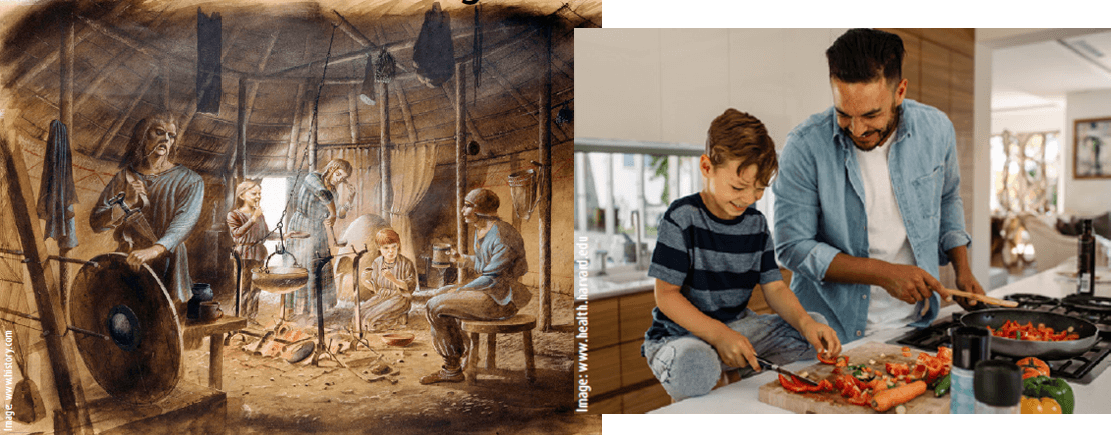
Many wonder: Who did
what is called work?
Have you ever wondered why
work comes up?
I must find harmony
between my life and work; I
think it is something that is
not going to be possible.
Have you ever thought
about what would be of society
if no one had worked since we
inhabited the Earth?
To work isn’t a punishment;
work ceased to be the activity
of slaves since the middle of
the Ancient Age.
Something very special
happens to us with what we
don’t want: we talk about a lot
of science, a lot of technology,
the knowledge society,
the information transmitted
in such a way that everything
is known at the moment it happens but we bring in our
thoughts remnants of times
very far about History.
In the 21st century we think
that there is no need to work
because work is a matter of
slaves and slavery was a form
of social organization of the
centuries before and after the
start of the Gregorian calendar
that we have in the West. It
means that many, but many
centuries ago, that happened
and Aristotle was one of those
who gave freedom to his slaves.
How many centuries ago was it
when Aristotle lived? Aristotle
was born in Estagira, Greece, in
384 B.C. and died in 322 B.C. in
Chalcis, Greece.
It seems that what we don’t
like to do our mind looks for
difficulties to justify us. We
have technology and technology
and we want more and more
little buttons to do nothing.
The twentieth century left
us an extraordinary development
of science and technology,
a form of organization for
production called Globalization
but we still think that to
work shouldn’t be. We divide the development
of humanity into Ages
and talk about the Ancient,
Middle, Modern and Contemporary
Ages. We have relevant
facts that identify each Age.
Ancient Age: from the rise
of writing until the end of the
Western Roman Empire in
476 A.C.
Middle Ages: from the
end of the Roman Empire of
the West until the fall of the
Roman Empire of the East -
1453 with the creation of the
printing press - 1455 and the
discovery of America -1492
Modern Age: from the
discovery of America to the
Independence of the United
States - 1776 along with the
French Revolution -1789.
Contemporary Age: from the
Independence of the United
States along with the French
Revolution to the present.
The great divisions mentioned
are given, as we see, by
great events that the human
species in its existence has
made and that since the first years of formal education
teach us.
The human being, we know,
for its nature, can’t live alone.
In that living with others, he
also lives with nature and
always looks for ways to make
it more favorable in terms of
what he gets from it.
The human being often
only obtains from nature, but
doesn’t generate sustainable
development.
Currently we have the
Agenda for the Sustainable
Development of
the United Nations for
Education, Science and
Culture Organization
(UNESCO). The agenda
has 17 principles that are
expected to be reached
on 2030 and which were
agreed at the 70th general
assembly of the United
Nations (UN), celebrated
in New York on 2015.
Atlantic International
University (AIU) participates
in the dissemination
and implementation
of this agenda inviting
students and staff to
work for sustainable
development.
The human being has developed
forms and forms of
production and has organized
to obtain goods in different
ways. We see the way in which
feudal society gave way to
the formation of States. The
society is organized by the
nuclei of human beings that
had a common way of relating;
States arise and social and
economic life is organized.
Human beings do activities
to obtain better goods; that’s
where the work comes from.
Modern states arose through
many social problems and the
interests of goods, of wealth,
brought great conflicts such
as the two World Wars: the
first from 1914 to 1918, and the
second from 1939 to 1945.
We still have unsolved problems
called: undeclared wars.
In general, we all know that
certain countries maintain
belligerence with others.
States emerged to organize
wealth and protect citizens.
What happened? Since the
mid-twentieth century Capitalism
took a turn towards globalized
trade and the State as
protector of society has lost its
strength and wonders if trade
carried out at the speed as it is
done should create universal
legislation, which means: the
death of the State.
It didn’t matter what relationship
you had with your
work because the State had
the ways for everyone to participate
in the production and
that is why the vast majority
of human beings expected
everything from the State.
Now the state seems to
leave their children orphaned
and that is when many will
learn what work is.
Work is your personal
development.
Work is the development
of your skills.
Work is the way to relate
to others to seek the best way to produce the
goods we need to create
sustainable development.
Work is the way to
integrate with others to
create better teaching
methods for everyone.
Work is also the best
way to produce science
and technology in a sustainable
way.
Work is the integration
of human beings in
groups to create better
organizations for human
living.
The relationship with others
to do our job makes it our life.
For the justifications that we
have just presented the work
must be loved because it is
what allows us to generate the
good life we want; the good
life means: the happy life.
Have you ever wondered
what would we be doing if
groups of human beings had
not met to work?
How would we be if we were
all sitting or sleeping without
doing anything?
It is true that society in
general has many things that
are not in the best way, for the interests of certain groups, but
with work and goodwill those
problems can be solved.
That indicates that we must
love what we do to develop all
the skills we have but also to
have quality of our lives.
The roads we see is that
the State is leaving its
children, orphans.
Love yourself, love
what you do.
Stop thinking the State
will resolve your life.
Transform those
wonderful skills that life
gave you through love of
yourself performing your
work.
The reasons of generating
harmony between
your life and work are
given by your nature as a
human being: create and
create to live.
Love your work because
it is the way to
manifest yourself as
a human being and
also through work it’s
how you will be happy
because you will
create yourself!
BIBLIOGRAPHY. Hobsbawm. E. (1998). Historia del siglo XX. Buenos
Aires: Grijalbo, Crítica. | Organización de las Naciones Unidas para la
Educación, la Ciencia y la Cultura (UNESCO), Homepage https://es.unesco.
org/about-us/introducing-unesco | UNESCO – AGENDA 2030 - DESARROLLO
SOSTENIBLE. Retrieved from http://www.unesco.org/new/fileadmin/
MULTIMEDIA/FIELD/Hanoi/2030_Brochure_SP.pdf | UNESCO – Objetivos
de Desarrollo Sostenible. Retrieved from https://es.unesco.org/sdgs

What you believe determines
your actions. If
you believe it is going to rain
later, you decide to carry an
umbrella with you.
If you believe that you
do not have enough time to
study, you do not make time.
In our minds, there are
phrases and images that are
repeated over and over again
mostly by our subconscious.
These phrases and images
determine our self-confidence,
self-identity, priorities, actions
and feelings.
You may want to study for
your courses. You may want
to learn and prepare your
assignments. Yet, you may
have beliefs repeating in your subconscious that do not let
you complete your courses.
So how can you make
sure that your beliefs will
help you study? You can do
affirmations.
Affirmations are simply
phrases that you repeat consciously.
Then your subconscious
learns these phrases
and begins to repeat them. So
by choosing certain affirmations,
you can re-program
your subconscious.
How do you use affirmations
for studying better?
First, you choose 3 to 6 affirmations
that will help you
study better. Here are some
examples.
• “I have enough time to study
every day.”
• “I have the concentration to
learn when I read.”
• “I enjoy studying.”
• “I love the effort to write an
essay and I love the feeling
when it receives an excellent
grade.”
• “Studying is making me a
better person.”
• “I enjoy what I am learning.”
• “I will make time to study every
day even when it seems
there is no time.”
• “My family is happy that
I am progressing in my
studies.”
• “I carry my books with me,
and I remember to read
every free chance I get.”
Next, you repeat your
affirmations for 2 to 5 minutes
a couple of times each
day. The most powerful times
are just before you sleep
and just as you wake up. At
these times, the mind is still
in the theta state and the
subconscious is more open to
communication.
The intention and truth of
the phrases will build inside
you. You will find the motivation
and time to study.
Also, when you are having a
difficult time studying; Maybe
you just can’t concentrate.
Just repeat some affirmations
while you breathe. You may
repeat in your mind, “I have
the energy and desire to study
right now. I enjoy studying.
I am learning what I want to
learn. I love to study.”
You will find that you can
study much better after repeating
these affirmations in
your mind.
One last thing to say. If you
identify a phrase or image
in your subconscious that is
blocking your efforts to study,
just affirm the opposite. Or
create an image in your mind
that is opposite. You will
more directly develop a more
productive and enjoyable
subconscious.

 Young people today are facing what
seems to be greater exposure to
complex issues like mental health, bullying,
and youth violence. As a result,
teachers are required to be well-versed
in far more than school curriculum to
ensure students are prepared to face
the world inside and outside of the
classroom. ...
Valerie Anglemyer, a middle school
teacher with more than 13 years of
experience, says it can be difficult to
create engaging course work that’s
applicable to the challenges students
face. ...
So what resources do teachers
turn to in an increasingly fractured
world? “Joining a professional learning
network that supports and challenges
thinking is one of the most impactful
things that a teacher can do to support
their own learning,” Anglemyer says.
A new program for teachers that
offers this network along with other
resources is the WE Teachers Program,
an initiative developed by Walgreens in
partnership with ME to WE and Mental
Health America. WE Teachers provides
tools and resources, at no cost to teachers,
looking for guidance around the
social issues related to poverty, youth
violence, mental health, bullying, and
diversity and inclusion. Through online
modules and trainings as well as a digital
community, these resources help ...
Young people today are facing what
seems to be greater exposure to
complex issues like mental health, bullying,
and youth violence. As a result,
teachers are required to be well-versed
in far more than school curriculum to
ensure students are prepared to face
the world inside and outside of the
classroom. ...
Valerie Anglemyer, a middle school
teacher with more than 13 years of
experience, says it can be difficult to
create engaging course work that’s
applicable to the challenges students
face. ...
So what resources do teachers
turn to in an increasingly fractured
world? “Joining a professional learning
network that supports and challenges
thinking is one of the most impactful
things that a teacher can do to support
their own learning,” Anglemyer says.
A new program for teachers that
offers this network along with other
resources is the WE Teachers Program,
an initiative developed by Walgreens in
partnership with ME to WE and Mental
Health America. WE Teachers provides
tools and resources, at no cost to teachers,
looking for guidance around the
social issues related to poverty, youth
violence, mental health, bullying, and
diversity and inclusion. Through online
modules and trainings as well as a digital
community, these resources help ...
 Italy is introducing a series of incentives
to end food waste. Instead
of throwing away leftover food, Italy
wants businesses that sell food to
donate unsold to charities rather than
throw it away.
The environmental, economic and
moral benefits are so clear that the
bill received broad support across
all political parties and is speeding
through the approval process. The
next step will be getting businesses to
comply, providing some sort of nudge
to change the current model of careless
waste.
Other countries such as France are
nudging businesses in the form of a
steep fine.
Italy is taking a different approach.
Instead of imposing penalties, the
country will give garbage collection
tax breaks to businesses that take part
in the initiative. All food donated by
businesses has to be recorded so the
tax break will be easy to implement.
Currently, the country spends
more than $13 billion USD on waste
management.
Through this latest bill, legislators
want to cut down on expenses. Ultimately,
they want to recover 1 billion
tonnes of excess food this year, up from
last year’s total of 550 million tonnes. ...
Read full text:
Italy is introducing a series of incentives
to end food waste. Instead
of throwing away leftover food, Italy
wants businesses that sell food to
donate unsold to charities rather than
throw it away.
The environmental, economic and
moral benefits are so clear that the
bill received broad support across
all political parties and is speeding
through the approval process. The
next step will be getting businesses to
comply, providing some sort of nudge
to change the current model of careless
waste.
Other countries such as France are
nudging businesses in the form of a
steep fine.
Italy is taking a different approach.
Instead of imposing penalties, the
country will give garbage collection
tax breaks to businesses that take part
in the initiative. All food donated by
businesses has to be recorded so the
tax break will be easy to implement.
Currently, the country spends
more than $13 billion USD on waste
management.
Through this latest bill, legislators
want to cut down on expenses. Ultimately,
they want to recover 1 billion
tonnes of excess food this year, up from
last year’s total of 550 million tonnes. ...
Read full text:
 In 2010, physicists in Germany
reported that they had made an
exceptionally precise measurement
of the size of the proton, the positively
charged building block of atomic
nuclei. ... Randolf Pohl of the Max
Planck Institute of Quantum Optics
and collaborators had measured the
proton using special hydrogen atoms
in which the electron that normally
orbits the proton was replaced by a
muon... Pohl’s team found the muonorbited
protons to be 0.84 femtometers
in radius —4% smaller than those in
regular hydrogen, according to the average
of more than two dozen earlier
measurements.
If the discrepancy was real, meaning
protons really shrink in the presence
of muons, this would imply unknown
physical interactions between protons
and muons ... Hundreds of papers
speculating about the possibility have
been written in the near-decade since.
But hopes that the “proton radius
puzzle” would upend particle physics
and reveal new laws of nature have
now been dashed by a new measurement
reported on Sept. 6 in Science.
... A team of physicists led by Eric
Hessels of York University in Toronto
set out to remeasure the proton in
regular, “electronic” hydrogen. Finally,
the results are in: Hessels and company
have pegged the proton’s radius at
0.833 femtometers, give or take 0.01, a
measurement exactly consistent with
Pohl’s value.
In 2010, physicists in Germany
reported that they had made an
exceptionally precise measurement
of the size of the proton, the positively
charged building block of atomic
nuclei. ... Randolf Pohl of the Max
Planck Institute of Quantum Optics
and collaborators had measured the
proton using special hydrogen atoms
in which the electron that normally
orbits the proton was replaced by a
muon... Pohl’s team found the muonorbited
protons to be 0.84 femtometers
in radius —4% smaller than those in
regular hydrogen, according to the average
of more than two dozen earlier
measurements.
If the discrepancy was real, meaning
protons really shrink in the presence
of muons, this would imply unknown
physical interactions between protons
and muons ... Hundreds of papers
speculating about the possibility have
been written in the near-decade since.
But hopes that the “proton radius
puzzle” would upend particle physics
and reveal new laws of nature have
now been dashed by a new measurement
reported on Sept. 6 in Science.
... A team of physicists led by Eric
Hessels of York University in Toronto
set out to remeasure the proton in
regular, “electronic” hydrogen. Finally,
the results are in: Hessels and company
have pegged the proton’s radius at
0.833 femtometers, give or take 0.01, a
measurement exactly consistent with
Pohl’s value.
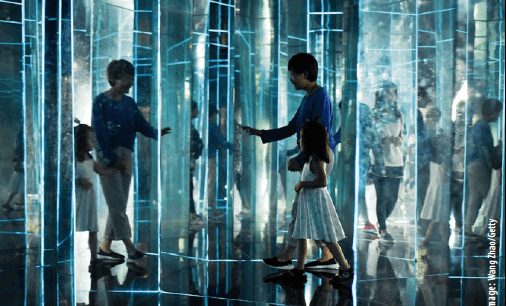 In the sixties, the physicist Richard
Feynman wrote, “I can safely say that
nobody understands quantum mechanics.”
Today, the situation hasn’t changed.
Sure, physicists use quantum mechanics.
They used the theory to anticipate
the existence of new particles like the
Higgs boson, and now they’re harnessing
its rules to build technologies like
quantum computers. But if you asked
physicists what the equations actually
say about reality? They wouldn’t be able
to definitively answer.
“Physicists tend to treat quantum mechanics
like a mindless robot they rely
on to perform certain tasks, not as a beloved
family member they care about on
a personal level,” writes Sean Carroll in
the prologue of his new book, Something
Deeply Hidden. The Caltech physicist
thinks that his colleagues have put off
thinking about the true meaning of
quantum mechanics for too long.
In particular, Carroll objects to the
mainstream approach to quantum mechanics
known formally as the Copenhagen
interpretation. Instead, he favors
a five-decade-old idea known as Many
Worlds, first proposed by physicist
Hugh Everett. It describes the universe
as a changing set of numbers, known
as the wave function, that evolves
according to a single equation. According
to Many Worlds, the universe
continually splits into new branches, to
produce multiple versions of ourselves.
In the sixties, the physicist Richard
Feynman wrote, “I can safely say that
nobody understands quantum mechanics.”
Today, the situation hasn’t changed.
Sure, physicists use quantum mechanics.
They used the theory to anticipate
the existence of new particles like the
Higgs boson, and now they’re harnessing
its rules to build technologies like
quantum computers. But if you asked
physicists what the equations actually
say about reality? They wouldn’t be able
to definitively answer.
“Physicists tend to treat quantum mechanics
like a mindless robot they rely
on to perform certain tasks, not as a beloved
family member they care about on
a personal level,” writes Sean Carroll in
the prologue of his new book, Something
Deeply Hidden. The Caltech physicist
thinks that his colleagues have put off
thinking about the true meaning of
quantum mechanics for too long.
In particular, Carroll objects to the
mainstream approach to quantum mechanics
known formally as the Copenhagen
interpretation. Instead, he favors
a five-decade-old idea known as Many
Worlds, first proposed by physicist
Hugh Everett. It describes the universe
as a changing set of numbers, known
as the wave function, that evolves
according to a single equation. According
to Many Worlds, the universe
continually splits into new branches, to
produce multiple versions of ourselves.
 The state of our privacy
is a concern. Going beyond tracking
your web browsing, facial recognition
algorithms and social surveillance
in public places also give privacy
advocates pause. Polish designer Ewa
Nowak has created a solution for this
type of Big Brother-esque monitoring
—an elegant and minimalist metal
mask called Incognito. It’s an abstract
metal mask that affixes to the front of
your face to make you unrecognizable
to a camera and its accompanying
smart software.
Made of brass, Incognito features
three shapes that fit your face. An
elongated polygon rests between your
eyebrows and spans the height of your
forehead while two circles cover either
cheekbone. Each shape is connected
by a strand of wire that also secures
the mask —it fits over your ears like a
pair of glasses.
When worn, Incognito really works.
“This project was preceded by a longterm
study on the shape, size, and
location of mask elements so that it
actually fulfills its task,” Nowak writes.
“When testing solutions, I used the
DeepFace algorithm, which is used by
Facebook.” The polished pieces on the
face deflect the software used to track
you while in public as well as through
social media.
The state of our privacy
is a concern. Going beyond tracking
your web browsing, facial recognition
algorithms and social surveillance
in public places also give privacy
advocates pause. Polish designer Ewa
Nowak has created a solution for this
type of Big Brother-esque monitoring
—an elegant and minimalist metal
mask called Incognito. It’s an abstract
metal mask that affixes to the front of
your face to make you unrecognizable
to a camera and its accompanying
smart software.
Made of brass, Incognito features
three shapes that fit your face. An
elongated polygon rests between your
eyebrows and spans the height of your
forehead while two circles cover either
cheekbone. Each shape is connected
by a strand of wire that also secures
the mask —it fits over your ears like a
pair of glasses.
When worn, Incognito really works.
“This project was preceded by a longterm
study on the shape, size, and
location of mask elements so that it
actually fulfills its task,” Nowak writes.
“When testing solutions, I used the
DeepFace algorithm, which is used by
Facebook.” The polished pieces on the
face deflect the software used to track
you while in public as well as through
social media.
 2019 is the 40th anniversary of
the Sony Walkman, and
while few would voluntarily return to
the dark days of manually rewinding
magnetic tape to find the right song,
the old device can’t help but create
pangs of nostalgia for a simpler time.
That’s the market that Sony is trying
to tap into with its special edition 40th
anniversary Walkman, unveiled at IFA.
No, this isn’t a return to the bad old
days of tape, but it does at least give
you the option of looking like you are.
The NW-A100TPS disguises its modern
music player technology with all
the trappings of 1979, with a case that
looks like the original Walkman.
2019 is the 40th anniversary of
the Sony Walkman, and
while few would voluntarily return to
the dark days of manually rewinding
magnetic tape to find the right song,
the old device can’t help but create
pangs of nostalgia for a simpler time.
That’s the market that Sony is trying
to tap into with its special edition 40th
anniversary Walkman, unveiled at IFA.
No, this isn’t a return to the bad old
days of tape, but it does at least give
you the option of looking like you are.
The NW-A100TPS disguises its modern
music player technology with all
the trappings of 1979, with a case that
looks like the original Walkman.
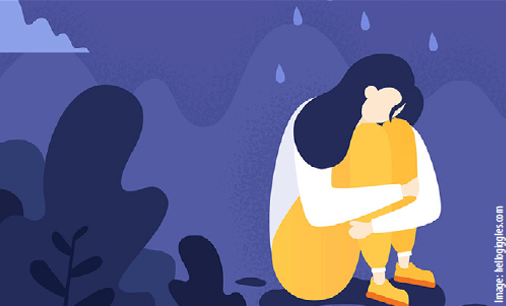 Normally when we think about
“PTSD,” our minds jump to those
who’ve been in combat. While it is certainly
an issue for those who’ve been
in real-life war zones, Post-Traumatic
Stress Disorder (PTSD) and Complex
PTSD isn’t just exclusive to war
veterans. In fact, many survivors of
childhood emotional neglect, physical
or emotional abuse, domestic violence,
sexual assault and rape can suffer from
the symptoms of PTSD or Complex
PTSD if they endured long-standing,
ongoing and inescapable trauma.
These individuals face combat and
battle in invisible war zones that are
nonetheless traumatic and potentially
damaging. According to the National
Center for PTSD, about 8 million people
can develop PTSD every year and
women are twice as likely than men to
experience these symptoms.
There are four types of symptoms
that are part of PTSD and some additional
symptoms for Complex PTSD as
listed below. Complex PTSD, which develops
due to chronic, ongoing trauma,
is more likely to occur due to long-term
domestic violence or childhood sexual
and/or physical or emotional abuse. ...
It is recommended that you seek
professional support if you’re struggling
with any of these symptoms,
especially if your symptoms last longer
than one month, cause great impairment
or distress and/or disrupt your
ability to function in everyday life.
Read full text:
Normally when we think about
“PTSD,” our minds jump to those
who’ve been in combat. While it is certainly
an issue for those who’ve been
in real-life war zones, Post-Traumatic
Stress Disorder (PTSD) and Complex
PTSD isn’t just exclusive to war
veterans. In fact, many survivors of
childhood emotional neglect, physical
or emotional abuse, domestic violence,
sexual assault and rape can suffer from
the symptoms of PTSD or Complex
PTSD if they endured long-standing,
ongoing and inescapable trauma.
These individuals face combat and
battle in invisible war zones that are
nonetheless traumatic and potentially
damaging. According to the National
Center for PTSD, about 8 million people
can develop PTSD every year and
women are twice as likely than men to
experience these symptoms.
There are four types of symptoms
that are part of PTSD and some additional
symptoms for Complex PTSD as
listed below. Complex PTSD, which develops
due to chronic, ongoing trauma,
is more likely to occur due to long-term
domestic violence or childhood sexual
and/or physical or emotional abuse. ...
It is recommended that you seek
professional support if you’re struggling
with any of these symptoms,
especially if your symptoms last longer
than one month, cause great impairment
or distress and/or disrupt your
ability to function in everyday life.
Read full text:
 1 Plank. Perfect for strengthening
your core, toning your abs, and
building up your shoulders. Get into a
push-up position on the floor, maintain
a 90 degree angle in your elbows,
and prop yourself up on your elbows
and your toes. Keep a straight line from
head to heels.
2 Push-ups. You are using your
triceps, shoulders, back, and chest,
which provides your entire upper body
with a workout. Lie flat on the floor
on your chest and stomach. Put your
hands next to your chest right under
your shoulders. Push up and bring
your torso, chest, and thighs off the
floor. Keep your abs tight so that your
body forms a straight line. Slowly come
back down to the floor.
3 Squats. Train your quadriceps,
glutes, hamstrings, and your whole
posterior chain. Start standing with
your feet shoulder-width apart, or
wider if you feel unstable. Lengthen
your spine, bend your knees,
and reach your hips back,
as if you’re sitting in a chair.
Come back to standing with
an exhale and repeat the
exercise.
4 Bird-dog. Strengthens
your abs, lower back,
glutes, and thighs. Kneel
with knees hip-width apart
and your hands firmly
placed on the ground about
shoulder-width apart. Lift one hand
and the opposite knee off floor while
balancing on the other hand and knee
to keep your weight centered. Stretch
your arm out straight in front and extend
the opposite leg behind you. Keep
a straight line from your hand to your
toes. Hold for a few seconds then return
to the starting position and repeat
the exercise for the other side.
5 Hip bridge. This is a core exercise
aimed at strengthening the glutes,
hamstrings, and erector spinae. Lay on
the floor on your back with your knees
bent and feet spread hip-width apart.
Keep your arms by your sides with the
palms facing down. Lift your pelvis up
and tightly squeeze your glutes. Hold
the position for a second and lower
your hips back to the floor. Repeat the
exercise. Read full text, find photos and the workout
plan/schedule:
Read full text:
1 Plank. Perfect for strengthening
your core, toning your abs, and
building up your shoulders. Get into a
push-up position on the floor, maintain
a 90 degree angle in your elbows,
and prop yourself up on your elbows
and your toes. Keep a straight line from
head to heels.
2 Push-ups. You are using your
triceps, shoulders, back, and chest,
which provides your entire upper body
with a workout. Lie flat on the floor
on your chest and stomach. Put your
hands next to your chest right under
your shoulders. Push up and bring
your torso, chest, and thighs off the
floor. Keep your abs tight so that your
body forms a straight line. Slowly come
back down to the floor.
3 Squats. Train your quadriceps,
glutes, hamstrings, and your whole
posterior chain. Start standing with
your feet shoulder-width apart, or
wider if you feel unstable. Lengthen
your spine, bend your knees,
and reach your hips back,
as if you’re sitting in a chair.
Come back to standing with
an exhale and repeat the
exercise.
4 Bird-dog. Strengthens
your abs, lower back,
glutes, and thighs. Kneel
with knees hip-width apart
and your hands firmly
placed on the ground about
shoulder-width apart. Lift one hand
and the opposite knee off floor while
balancing on the other hand and knee
to keep your weight centered. Stretch
your arm out straight in front and extend
the opposite leg behind you. Keep
a straight line from your hand to your
toes. Hold for a few seconds then return
to the starting position and repeat
the exercise for the other side.
5 Hip bridge. This is a core exercise
aimed at strengthening the glutes,
hamstrings, and erector spinae. Lay on
the floor on your back with your knees
bent and feet spread hip-width apart.
Keep your arms by your sides with the
palms facing down. Lift your pelvis up
and tightly squeeze your glutes. Hold
the position for a second and lower
your hips back to the floor. Repeat the
exercise. Read full text, find photos and the workout
plan/schedule:
Read full text:
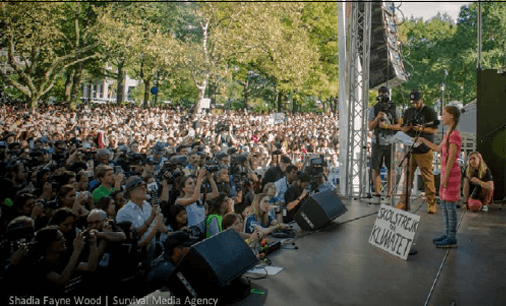
 Rapid climate change of our own
making is transforming every bit of
ocean and land, imperiling organisms
clear across the tree of life. It’s killing people
by way of stronger storms and hotter
heat waves and unchecked pollution.
But let’s not lose sight of the root cause
of this crisis: rampant capitalism. Capitalism
has steamrolled this planet and its
organisms, gouging out mountains, overexploiting
fish stocks, and burning fossil
fuels to power the maniacal pursuit of
growth and enrich a fraction of humanity.
Since 1988, 100 corporations have
been responsible for 70% of greenhouse
gas emissions.
Most of us have heard of the Anthropocene,
humanity’s stain on the
geological record through activities
like land misuse and plastic pollution.
Jason Moore, an environmental
historian and sociologist at Binghamton
University, calls the problem
the Capitalocene. WIRED sat down
with Moore to talk about what got us
into this mess, why capitalism won’t
survive it, and what a brighter future
might actually look like. ...
Jason Moore: ... Most carbon dioxide
doesn’t come from people flying
around the world, although that’s a
major contributor to it. It comes from
production. For younger people there
seems to be a kind of cognitive dissonance
between yes, we are responsible,
and at the same time we know
that we are not responsible.
Rapid climate change of our own
making is transforming every bit of
ocean and land, imperiling organisms
clear across the tree of life. It’s killing people
by way of stronger storms and hotter
heat waves and unchecked pollution.
But let’s not lose sight of the root cause
of this crisis: rampant capitalism. Capitalism
has steamrolled this planet and its
organisms, gouging out mountains, overexploiting
fish stocks, and burning fossil
fuels to power the maniacal pursuit of
growth and enrich a fraction of humanity.
Since 1988, 100 corporations have
been responsible for 70% of greenhouse
gas emissions.
Most of us have heard of the Anthropocene,
humanity’s stain on the
geological record through activities
like land misuse and plastic pollution.
Jason Moore, an environmental
historian and sociologist at Binghamton
University, calls the problem
the Capitalocene. WIRED sat down
with Moore to talk about what got us
into this mess, why capitalism won’t
survive it, and what a brighter future
might actually look like. ...
Jason Moore: ... Most carbon dioxide
doesn’t come from people flying
around the world, although that’s a
major contributor to it. It comes from
production. For younger people there
seems to be a kind of cognitive dissonance
between yes, we are responsible,
and at the same time we know
that we are not responsible.
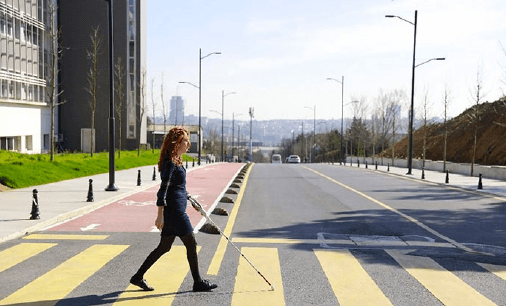 Recently, a revolutionizing smart
cane called WeWalk has been
introduced to help blind people navigate
their surroundings much more
efficiently when they are on their own.
The cane was invented by a visually
impaired engineer Kursat Ceylan, who
is the CEO and co-founder of Young
Guru Academy (YGA), the Turkish
non-profit behind WeWalk. Being
blind himself, Ceylan knows firsthand
what challenges people like him face
and decided to put his knowledge into
inventing something that could greatly
improve people’s life.
“In these days, we are talking about
flying cars, but these people have been
using just a plain stick. As a blind person,
when I am at the Metro station, I
don’t know which is my exit… I don’t
know which bus is approaching…
which stores are around me. That kind
of information can be provided with
the WeWalk,” he told CNN.
The smart cane assists visually
impaired people using smart technology,
some of which we use every day.
It’s equipped with built-in speakers, a
voice assistant, Google, and sensors
that send vibrations to warn about
obstacles above chest level. The smart
cane is available on the company’s
website and runs for around $500.
Read full text and watch video:
Recently, a revolutionizing smart
cane called WeWalk has been
introduced to help blind people navigate
their surroundings much more
efficiently when they are on their own.
The cane was invented by a visually
impaired engineer Kursat Ceylan, who
is the CEO and co-founder of Young
Guru Academy (YGA), the Turkish
non-profit behind WeWalk. Being
blind himself, Ceylan knows firsthand
what challenges people like him face
and decided to put his knowledge into
inventing something that could greatly
improve people’s life.
“In these days, we are talking about
flying cars, but these people have been
using just a plain stick. As a blind person,
when I am at the Metro station, I
don’t know which is my exit… I don’t
know which bus is approaching…
which stores are around me. That kind
of information can be provided with
the WeWalk,” he told CNN.
The smart cane assists visually
impaired people using smart technology,
some of which we use every day.
It’s equipped with built-in speakers, a
voice assistant, Google, and sensors
that send vibrations to warn about
obstacles above chest level. The smart
cane is available on the company’s
website and runs for around $500.
Read full text and watch video:
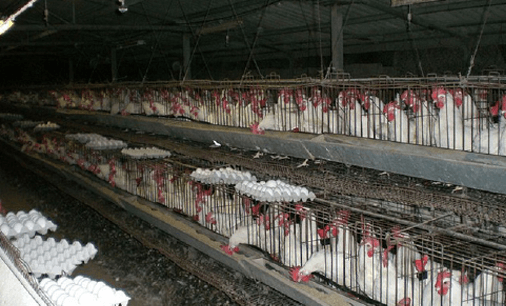 On May 8th, Washington Gov. Jay
Inslee signed a bill setting welfare
requirements for egg-laying hens
—the strongest such bill ever to pass
a state legislature. By 2023, it will be
illegal to sell eggs in Washington if the
hens were raised in excessively small
cages. The law will affect about eight
million hens each year. ...
Why is this a big deal? Because
millions of birds live on factory farms
producing eggs, and the conditions
they’re kept in are pretty terrible.
We’re finally making progress towards
improving those conditions.
There are many ways to raise egglaying
hens on a factory farm. One
method, battery cages, keeps each hen
in an area about 67-76 square inches
big (approximately the dimensions of an iPad). Birds show a lot of distress
under those conditions, tending to injure
themselves, lose their feathers, and
end up covered with cuts and bruises.
The alternative methods aren’t great
for birds either, but welfare researchers
think they’re a little better. The cheapest
alternative method (and therefore
the one that most producers will likely
switch to) is called an aviary system. ...
Washington will require that birds
have enough space to turn around and
spread their wings; that they’ll have
access to perches and dust baths; and
that they will be able to socialize with
other birds. It’s a start on the path
toward humane conditions. ...
Read full text:
On May 8th, Washington Gov. Jay
Inslee signed a bill setting welfare
requirements for egg-laying hens
—the strongest such bill ever to pass
a state legislature. By 2023, it will be
illegal to sell eggs in Washington if the
hens were raised in excessively small
cages. The law will affect about eight
million hens each year. ...
Why is this a big deal? Because
millions of birds live on factory farms
producing eggs, and the conditions
they’re kept in are pretty terrible.
We’re finally making progress towards
improving those conditions.
There are many ways to raise egglaying
hens on a factory farm. One
method, battery cages, keeps each hen
in an area about 67-76 square inches
big (approximately the dimensions of an iPad). Birds show a lot of distress
under those conditions, tending to injure
themselves, lose their feathers, and
end up covered with cuts and bruises.
The alternative methods aren’t great
for birds either, but welfare researchers
think they’re a little better. The cheapest
alternative method (and therefore
the one that most producers will likely
switch to) is called an aviary system. ...
Washington will require that birds
have enough space to turn around and
spread their wings; that they’ll have
access to perches and dust baths; and
that they will be able to socialize with
other birds. It’s a start on the path
toward humane conditions. ...
Read full text:
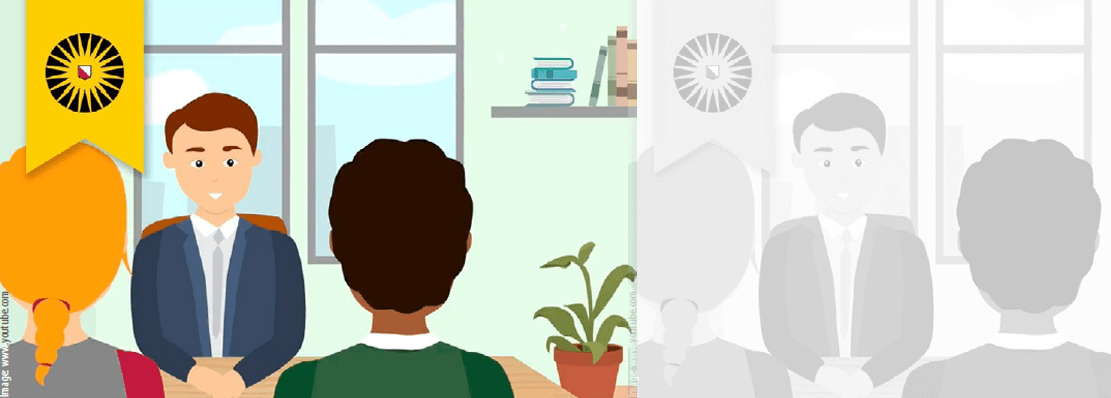
 Automatic pot stirrer.
By incorporating automatic rotating
action it prevents burning and frees up
your hands to take on other food prep
steps. Designed by Gavin Reay.
www.thegrommet.com
Automatic pot stirrer.
By incorporating automatic rotating
action it prevents burning and frees up
your hands to take on other food prep
steps. Designed by Gavin Reay.
www.thegrommet.com
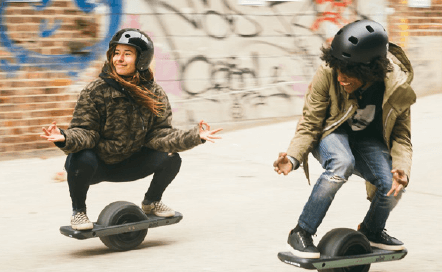 Easiest to ride electric board.
It’s built for your short city commutes. onewheel.com
Easiest to ride electric board.
It’s built for your short city commutes. onewheel.com
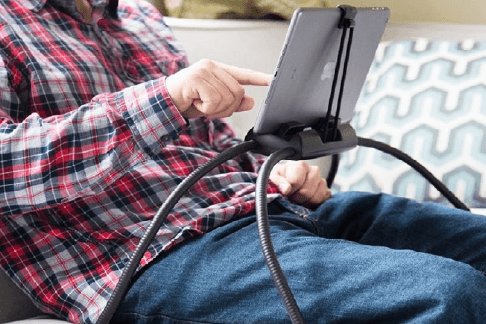
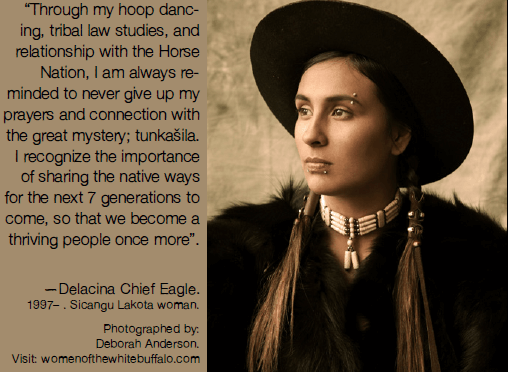 “Through my hoop dancing,
tribal law studies, and
relationship with the Horse
Nation, I am always reminded
to never give up my
prayers and connection with
the great mystery; tunkašila.
I recognize the importance
of sharing the native ways
for the next 7 generations to
come, so that we become a
thriving people once more”.
—Delacina Chief Eagle.
“Through my hoop dancing,
tribal law studies, and
relationship with the Horse
Nation, I am always reminded
to never give up my
prayers and connection with
the great mystery; tunkašila.
I recognize the importance
of sharing the native ways
for the next 7 generations to
come, so that we become a
thriving people once more”.
—Delacina Chief Eagle.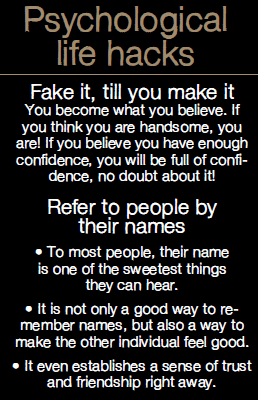 Fake it, till you make it
You become what you believe. If
you think you are handsome, you
are! If you believe you have enough
confidence, you will be full of confidence,
no doubt about it!
Refer to people by
their names
Fake it, till you make it
You become what you believe. If
you think you are handsome, you
are! If you believe you have enough
confidence, you will be full of confidence,
no doubt about it!
Refer to people by
their names The Bachelor of Forensic Accounting
program is designed to provide
students with the knowledge and
skills in the field. This degree includes
courses in techniques, fraud detection,
data management, business valuation,
and the ethical aspect of this
profession. This program considers the
creation and use of control, planning,
and performance information; it is
designed to advance the professional
development of experienced accounting
graduates and professionals by
extending their knowledge and equipping
them with broad research and
process accounting skills, enabling
them to make a key leadership contribution
to their chosen fields.
AIU’s Bachelor of Forensic Accounting
goes one step further by allowing
students to study and research
multiple key areas of computer science
to develop a unique foundation
of practical knowledge and computer
science theory.
Your AIU distance learning Bachelor
of Forensic Accounting will be a
custom-made program, designed just
for you by you and your advisor. This
flexibility to meet your needs is seldom
found in other distance learning
programs. Our program does not require
every student to study the same
subjects and use the same books and
other learning materials as every other
student. Instead our online Bachelor
programs are designed just for you.
They are individually designed to meet
your needs and help you to reach your
professional and personal goals.
The Bachelor of Forensic Accounting
program is designed to provide
students with the knowledge and
skills in the field. This degree includes
courses in techniques, fraud detection,
data management, business valuation,
and the ethical aspect of this
profession. This program considers the
creation and use of control, planning,
and performance information; it is
designed to advance the professional
development of experienced accounting
graduates and professionals by
extending their knowledge and equipping
them with broad research and
process accounting skills, enabling
them to make a key leadership contribution
to their chosen fields.
AIU’s Bachelor of Forensic Accounting
goes one step further by allowing
students to study and research
multiple key areas of computer science
to develop a unique foundation
of practical knowledge and computer
science theory.
Your AIU distance learning Bachelor
of Forensic Accounting will be a
custom-made program, designed just
for you by you and your advisor. This
flexibility to meet your needs is seldom
found in other distance learning
programs. Our program does not require
every student to study the same
subjects and use the same books and
other learning materials as every other
student. Instead our online Bachelor
programs are designed just for you.
They are individually designed to meet
your needs and help you to reach your
professional and personal goals.
 Atlantic International University is accredited by the Accreditation Service for International
Schools, Colleges and Universities (ASIC). ASIC Accreditation is an internationally
renowned quality standard for colleges and universities. Visit ASIC’s Directory of Accredited
Colleges and Universities. ASIC is a member of CHEA International Quality Group
(CIQG) in the USA, an approved accreditation body by the Ministerial Department of the Home Office
in the UK, and is listed in the International Directory of the Council for Higher Education Accreditation
(CHEA). The University is based in the United States and was established by corporate charter in 1998.
Atlantic International University is accredited by the Accreditation Service for International
Schools, Colleges and Universities (ASIC). ASIC Accreditation is an internationally
renowned quality standard for colleges and universities. Visit ASIC’s Directory of Accredited
Colleges and Universities. ASIC is a member of CHEA International Quality Group
(CIQG) in the USA, an approved accreditation body by the Ministerial Department of the Home Office
in the UK, and is listed in the International Directory of the Council for Higher Education Accreditation
(CHEA). The University is based in the United States and was established by corporate charter in 1998.
 In some cases, accredited colleges
may not accept for transfer courses and degrees
completed at unaccredited colleges, and some
employers may require an accredited degree as
a basis for eligibility for employment. Potential
students should consider how the above may affect
their interests, AIU respects the unique rules and
regulations of each country and does not seek to
influence the respective authorities. In the event
that a prospective student wishes to carry out any
government review or process in regards to his
university degree, we recommend that the requirements
of such are explored in detail with the relevant
authorities by the prospective student as the
university does not intervene in such processes.
AIU students can be found in over 180 countries,
they actively participate and volunteer
in their communities as part of their academic
program and have allocated thousands of service
hours to diverse causes and initiatives. AIU
programs follow the standards commonly used by
colleges and universities in the United States with
regards to the following: academic program
structure, degree issued, transcript, and
other graduation documents.
AIU graduation documents can include
an apostille and authentication from the
US Department of State to facilitate their
use internationally.
In some cases, accredited colleges
may not accept for transfer courses and degrees
completed at unaccredited colleges, and some
employers may require an accredited degree as
a basis for eligibility for employment. Potential
students should consider how the above may affect
their interests, AIU respects the unique rules and
regulations of each country and does not seek to
influence the respective authorities. In the event
that a prospective student wishes to carry out any
government review or process in regards to his
university degree, we recommend that the requirements
of such are explored in detail with the relevant
authorities by the prospective student as the
university does not intervene in such processes.
AIU students can be found in over 180 countries,
they actively participate and volunteer
in their communities as part of their academic
program and have allocated thousands of service
hours to diverse causes and initiatives. AIU
programs follow the standards commonly used by
colleges and universities in the United States with
regards to the following: academic program
structure, degree issued, transcript, and
other graduation documents.
AIU graduation documents can include
an apostille and authentication from the
US Department of State to facilitate their
use internationally.
 The School of Business and Economics
allows aspiring and practicing
professionals, managers, and entrepreneurs
in the private and public sectors
to complete a self paced distance
learning degree program of the highest
academic standard.
The ultimate goal is to empower
learners and help them take advantage
of the enormous array of resources
from the world environment in order
to eliminate the current continuum of
poverty and limitations.
Degree programs are designed for
those students whose professional experience has been in business,
marketing, administration, economics,
finance and management.
The School of Business and Economics
allows aspiring and practicing
professionals, managers, and entrepreneurs
in the private and public sectors
to complete a self paced distance
learning degree program of the highest
academic standard.
The ultimate goal is to empower
learners and help them take advantage
of the enormous array of resources
from the world environment in order
to eliminate the current continuum of
poverty and limitations.
Degree programs are designed for
those students whose professional experience has been in business,
marketing, administration, economics,
finance and management.
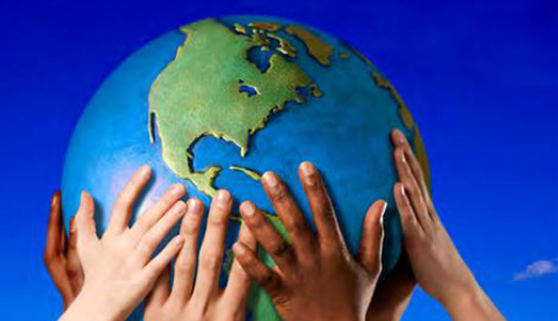 The School of Social and Human Studies
is focused on to the development of
studies which instill a core commitment
to building a society based on social and
economic justice and enhancing opportunities
for human well being.
The founding principles lie on the
basic right of education as outlined
in the Declaration of Human Rights.
We instill in our students a sense of
confidence and self reliance in their
ability to access the vast opportunities
available through information channels,
the world wide web, private, public,
nonprofit, and nongovernmental organizations in an ever expanding
global community.
Degree programs are aimed towards
those whose professional life has been
related to social and human behavior,
with the arts, or with cultural studies.
The School of Social and Human Studies
is focused on to the development of
studies which instill a core commitment
to building a society based on social and
economic justice and enhancing opportunities
for human well being.
The founding principles lie on the
basic right of education as outlined
in the Declaration of Human Rights.
We instill in our students a sense of
confidence and self reliance in their
ability to access the vast opportunities
available through information channels,
the world wide web, private, public,
nonprofit, and nongovernmental organizations in an ever expanding
global community.
Degree programs are aimed towards
those whose professional life has been
related to social and human behavior,
with the arts, or with cultural studies.
 The School of Science and Engineering
seeks to provide dynamic, integrated,
and challenging degree programs
designed for those whose experience
is in industrial research, scientific production,
engineering and the general
sciences. Our system for research and
education will keep us apace with the
twenty-first century reach scientific
advance in an environmentally and
ecologically responsible manner to allow
for the sustainability of the human
population. We will foster among our
students a demand for ethical behavior,
an appreciation for diversity, an understanding
of scientific investigation, knowledge of design innovation, a
critical appreciation for the importance
of technology and technological change
for the advancement of humanity.
The School of Science and Engineering
seeks to provide dynamic, integrated,
and challenging degree programs
designed for those whose experience
is in industrial research, scientific production,
engineering and the general
sciences. Our system for research and
education will keep us apace with the
twenty-first century reach scientific
advance in an environmentally and
ecologically responsible manner to allow
for the sustainability of the human
population. We will foster among our
students a demand for ethical behavior,
an appreciation for diversity, an understanding
of scientific investigation, knowledge of design innovation, a
critical appreciation for the importance
of technology and technological change
for the advancement of humanity.
 With access to a global catalog created and maintained collectively by more than
9,000 participating institutions, AIU students have secured excellent research
tools for their study programs.
With access to a global catalog created and maintained collectively by more than
9,000 participating institutions, AIU students have secured excellent research
tools for their study programs.